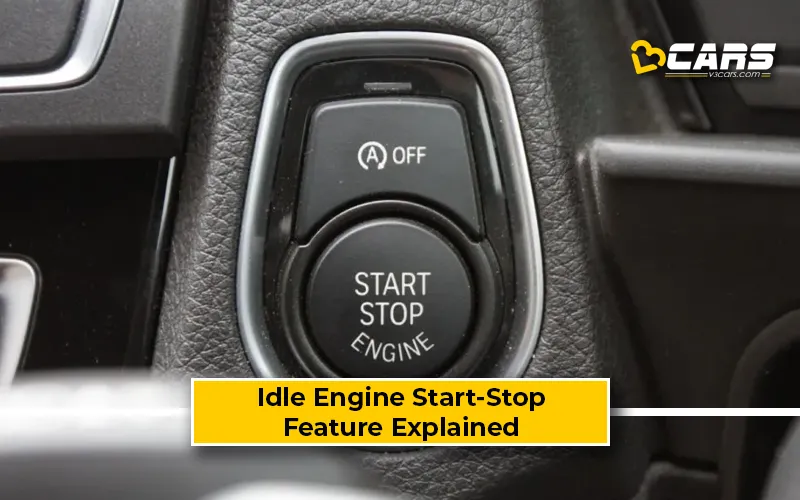Idle Engine Start-Stop - Feature Explained
Ever sat idling at a red light, engine running, and wished you could save fuel and reduce emissions? Enter the Idle Engine Start-Stop system, a technology designed to do just that. But is it effective and efficient as it is touted out to be, or are there hidden gremlins? Let's delve into the pros, cons, and everything in between to help you decide if the idle engine start-stop feature is a friend or foe for your driving experience.

What Is Engine Idle Start-Stop?
Imagine this: You come to a stop, the engine automatically shuts off, saving fuel and emissions. When you release the brake, it seamlessly restarts, ready to go. That's the magic of Idle Start-Stop. This system uses sensors to detect when your car is stationary and automatically turns off the engine, typically after a few seconds. When you move again, the engine instantly restarts, usually smoother than you might expect.
How Does Engine Idle Start-Stop Work?
The system relies on a network of sensors and a powerful starter motor. Here’s a breakdown:
- Sensors: These monitor various parameters like vehicle speed, brake pedal position, steering wheel angle, and battery charge. When the car is stationary, in neutral (or “Drive” with the brake firmly pressed in automatics), and other conditions are met (like engine temperature and climate control demand), the system activates.
- Engine Control Unit (ECU): The ECU is the brain of the system. It receives data from the sensors and decides when to stop and restart the engine.
- Reinforced Starter Motor: Unlike traditional starters, the start-stop system uses a more robust starter motor designed for frequent use.
- Advanced Battery: Cars with this technology typically use an Enhanced Flooded Battery (EFB) or an Absorbent Glass Mat (AGM) battery. These are designed to withstand the increased cycling (repeated charging and discharging) associated with frequent engine restarts.
- Brake and Steering Systems: These systems are often electronically assisted to maintain functionality even when the engine is off. For instance, power steering assist may be provided by an electric pump.
What Are The Pros And Cons Of Engine Idle Start-Stop?
The pros or advantages of engine idle start-stop are:
- Fuel Efficiency: Studies show Start-Stop systems can improve fuel economy by 5-15%, especially in stop-and-go traffic. This translates to saving money at the pump and reducing your environmental footprint.
- Emission Reduction: By minimising idling time, these systems also help curb harmful emissions, contributing to cleaner air.
- Quieter Streets: Less engine noise, especially in urban areas, translates to a calmer and more peaceful driving experience for everyone.
The cons or disadvantages of engine idle start-stop are:
- Battery Strain: Frequent restarts can put stress on your car's battery, potentially shortening its lifespan. However, modern batteries are designed to handle this demand.
- Jumpy Restarts: Some drivers find the frequent restarts jumpy or jarring, especially in heavy traffic. Some systems offer options to disable the feature if it bothers you.
- Wear and Tear: Some argue that frequent restarts cause increased wear and tear on the starter motor and engine components. However, studies suggest the benefits outweigh the potential downsides.
Is It Possible To Install Engine Idle Start Stop From Aftermarket?
Retrofitting an idle start-stop system to a car not originally equipped with it is generally complex and not recommended. It requires significant modifications to the vehicle’s electrical system, ECU, starter motor, battery, and potentially other components. The cost and complexity usually outweigh the potential benefits. It’s best to look for vehicles that have this feature as a factory option.
How Expensive Is It To Repair A Faulty Engine Idle Start Stop System?
Repairing a faulty start-stop system can vary in cost depending on the specific issue. Some common problems and their potential costs include:
- Battery Replacement: Replacing an EFB or AGM battery is more expensive than a standard car battery.
- Starter Motor Replacement: A heavy-duty starter motor for a start-stop system is also more expensive than a standard starter.
- Sensor or ECU Issues: Problems with sensors or the ECU can be more complex to diagnose and repair, potentially involving diagnostic fees and more expensive parts.
- Software Updates: Sometimes, software updates to the ECU can resolve issues, which may involve a smaller fee at a dealership.
Should You Buy A Car With Engine Idle Start-Stop?
Ultimately, the decision depends on your driving habits and preferences. If you primarily drive in city traffic with frequent stops, this feature can offer significant fuel and emission savings. However, if you mainly drive on highways or find the restarts bothersome, you might opt to disable it.
Additional factors to consider:
- Car compatibility: Not all cars come with Idle Start-Stop as standard. Check your car's manual or manufacturer's website for availability.
- Disabling options: Most systems allow you to temporarily or permanently disable the feature if needed.
- Maintenance: Keep your car's battery and electrical system in good condition to ensure smooth operation of the Start-Stop system.
Ultimately, Idle Engine Start-Stop is a promising technology with clear benefits for the environment and your wallet. While it might not be for everyone, its increasing popularity reflects its potential to transform our driving habits for a more sustainable future. So, consider giving it a try and see if this feature becomes a friend or foe in your driving experience!
Note: Check your Car EMI with our - Car Loan EMI Calculator
You can use our Fuel Cost Calculator to see how any petrol, diesel or CNG car will cost to run based on the latest fuel price in your city.



0 Comments